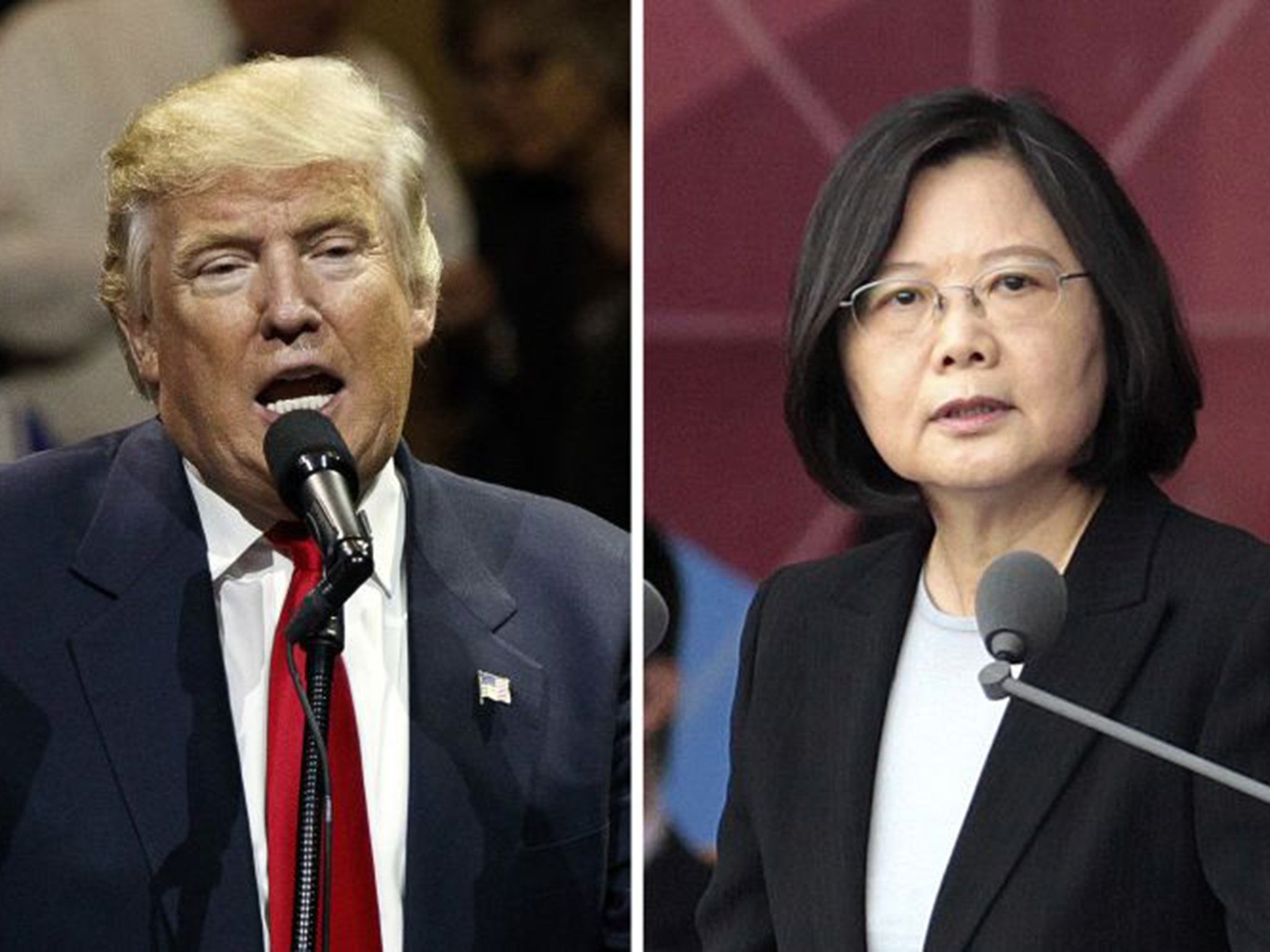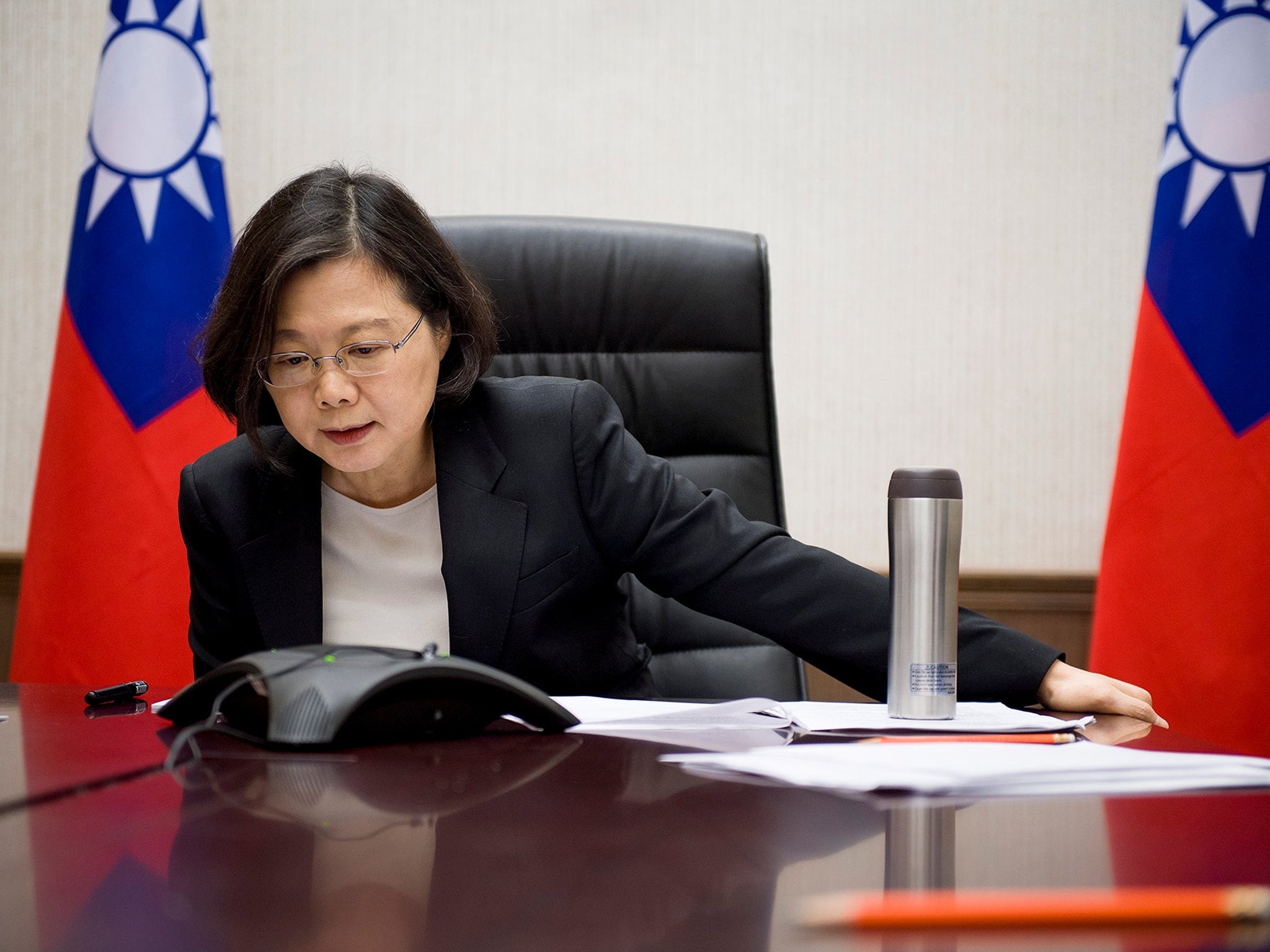China issues diplomatic protest against Donald Trump for phone call to Taiwan president
The President-elect took a 10 minute phone call with Tsai Ing-wen

Your support helps us to tell the story
From reproductive rights to climate change to Big Tech, The Independent is on the ground when the story is developing. Whether it's investigating the financials of Elon Musk's pro-Trump PAC or producing our latest documentary, 'The A Word', which shines a light on the American women fighting for reproductive rights, we know how important it is to parse out the facts from the messaging.
At such a critical moment in US history, we need reporters on the ground. Your donation allows us to keep sending journalists to speak to both sides of the story.
The Independent is trusted by Americans across the entire political spectrum. And unlike many other quality news outlets, we choose not to lock Americans out of our reporting and analysis with paywalls. We believe quality journalism should be available to everyone, paid for by those who can afford it.
Your support makes all the difference.President-elect Donald Trump has spoken directly with Taiwan President Tsai Ing-wen - breaking with nearly four decades of US policy - in a move brought a swift protest of China amid fears relations with Beijing could be damaged.
The 10-minute telephone call with Taiwan's leadership was the first by a US president-elect or president since President Jimmy Carter switched diplomatic recognition from Taiwan to China in 1979, acknowledging Taiwan as part of “one China”.
China's Foreign Ministry said it had lodged "stern representations" with what it called the "relevant US side", urging the careful handling of the Taiwan issue to avoid any unnecessary disturbances in the relationship of the two superpowers.
"The one China principle is the political basis of the China-US relationship," it said.
The US first adopted the 'One China' policy in 1972 following meetings between then President Richard Nixon and Chairman Mao Tse-tung. The agreement was finally solidified by Jimmy Carter. Under that policy, the US recognises Beijing as representing China, but retains unofficial ties with Taiwan. China considers Taiwan a wayward province and relations between the two sides have worsened since Ms Tsai, who heads the pro-independence Democratic Progressive Party, was elected president in January.
Speaking hours after the call, China’s Foreign Minister Wang Yi apparently blamed Taiwan for the exchange.
"This is just the Taiwan side engaging in a petty action, and cannot change the 'one China' structure already formed by the international community," Mr Wang said at an academic forum in Beijing, state media reported.
"I believe that it won't change the longstanding 'one China' policy of the United States government."

On Saturday, Taiwan's policy making body on China said Beijing must look at the call “calmly”.
“We call on China to face the new situation in the Asia-Pacific region and work with us towards developing a benign cross-strait relationship,” the Mainland Affairs Council said in a statement, referring to the stretch of water between the two sides.
The White House was adamant there was "no change" to the longstanding "one China" policy.
"We remain firmly committed to our 'one China' policy," said Ned Price, a national security spokesman for President Barack Obama. "Our fundamental interest is in peaceful and stable cross-Strait relations."
Mr Trump took to Twitter and said: "The President of Taiwan CALLED ME today to wish me congratulations on winning the Presidency. Thank you!"
Alex Huang, a spokesman for Ms Tsai, later said “both sides agreed ahead of time before making contact.”
China's influential state-run tabloid the Global Times said in an online editorial that if Mr Trump really overturned the “One China” principle upon assuming office, it would create such a crisis with China he'd have little time to do anything else.
“We believe this is not something the shrewd Trump wants to do.”
Taiwan's official Central News Agency, citing anonymous sources,claimed Edwin Feulner, former president of the Heritage Foundation, a Washington-based conservative think tank, was a “crucial figure” in setting up communication channels between the sides, leading to the call. Mr Feulner had met with Tsai in October when he led a delegation from the think tank on a trip to Taiwan, according to a release at the time from Taiwan's presidential office. That release said Ms Tsai called Mr Feulner a “longtime friend to Taiwan” and conveyed her gratitude to his foundation for its support.
The call also has drawn attention to Taiwanese media reports that the Trump Organisation is interested in investing in the Taiwanese city of Taoyuan, near Taipei. The city's mayor, Cheng Wen-tsan, said in a statement on the city government's website last month that a representative of the Trump Organisation had visited the city and expressed interest in investing in hotels near the airport. The statement said the visit was too brief for both sides to get into details. The Trump Organisation has denied it has any projects planned in Taiwan.
Washington remains Taiwan's most important political ally and sole arms supplier, despite the lack of formal diplomatic ties, the irony of which was not lost on Mr Trump.
“Interesting how the US sells Taiwan billions of dollars of military equipment but I should not accept a congratulatory call,” Trump said in another tweet.
Mr Trump has eschewed tradition in other calls with foreign leaders since he won the US election, prompting the White House to encourage him to make use of the diplomatic expertise and counsel of the State Department.
During the call, Mr Trump and Ms Tsai noted that "close economic, political and security ties exist between Taiwan and the United States", the Trump transition team said in a statement.
Taiwan's presidential office said the two discussed strengthening bilateral interactions and establishing closer cooperation.
Agencies contributed to this report
Join our commenting forum
Join thought-provoking conversations, follow other Independent readers and see their replies
Comments